| Reviews & Columns |
|
Reviews DVD TV on DVD Blu-ray 4K UHD International DVDs In Theaters Reviews by Studio Video Games Features Collector Series DVDs Easter Egg Database Interviews DVD Talk Radio Feature Articles Columns Anime Talk DVD Savant Horror DVDs The M.O.D. Squad Art House HD Talk Silent DVD
|
DVD Talk Forum |
|
|
| Resources |
|
DVD Price Search Customer Service #'s RCE Info Links |
|
Columns
|
|
|
Callan - Set 2
"You start off with one simple premise: everything smells. Yourself. The job you're doing. And the man who told you to do it."
"When you're in as deep as I am...they don't let you go. "
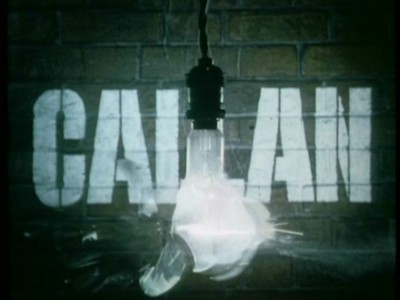
Even better than the last go-around...but unfortunately for fans, the last go-around for Callan. Acorn Media has released Callan - Set 2, a 13-episode gathering of the final "series" of the downbeat British spy television show from 1971. As an added treat for fans of this cult favorite, two episode commentary tracks with the recently-passed star Edward Woodward, recorded in 2000 (I believe), are included for this last Callan series. The lines blur even more here between "hero" and "villain," Callan becomes more and more dissatisfied with his career and his life, the dirty deals he's forced to execute become more and more pointless (and deadly), and Lonely continues to stink up the place. A measurable improvement over the previous season/"series," Callan - Set 2 is must-viewing for enthusiasts of the 60s and 70s British espionage genre.
Edward Woodward plays David Callan, the top operative for "The Section," an ultra-secret British intelligence agency that handles delicate matters of security with any means at their disposal: surveillance, blackmail, the ruination of a person's character, imprisonment, and of course, assassination (all according to the color-coded files someone might find himself in). Being the number one operative with "The Section," though, does have its drawbacks - such as the Russian KGB looked to take you out at every opportunity. Indeed, Callan, having botched his last assignment (and now residing in a KGB prison undergoing corrosive drug interrogation) is considered a worthy-enough prize to trade for a highly-valuable KGB operative, Richmond (T.P. McKenna). This doesn't make Callan's superiors "Hunter" (William Squire) and "Bishop" (Geoffrey Chater) any more pleased: what are they to do when their top agent's cover's been blown and he's returned to them, essentially useless? Perhaps Callan can become the new "Hunter," a prospect that leaves the embittered Callan enraged - but one that he must accept or else wind up with his own "red file" (i.e.: on a hit list for knowing too much). The reemergence of his former tormentor, smug agent Toby Meres (Anthony Valentine) marks a new low for Callan; psycho fellow agent James Cross (Patrick Mower) is still screwing up; and smelly only-friend Lonely (Russell Hunter), continues to get Callan into more difficult situations. Will Callan's career - and life - with "The Section" end with a bang, or a whimper?
MAJOR SPOILERS ALERT!
I've written before about Callan (you may want to reference that review for background info on the series' complicated backstory, including how and why most of the first two series' episodes were "wiped"), and while I didn't find anything startlingly "new" in that first set from Acorn Media (which was actually the series' third season), I did enjoy the world-weary, anti-heroics of the piece - and particularly the performances. As I wrote in that review, what one experiences in Callan isn't radically different or original in comparison to anything one would find in Le Carre or Deighton. From the opening title sequence, where the theme music evokes the one John Barry devised for The IPCRESS File, Callan covers then-and-now familiar ground, with conflicted professional/moralist/cold-blooded assassin Callan merging the existential world-weariness of Le Carre's Alec Leamas, with the grubby, plebeian monotony of Deighton's economically-depressed unnamed spy hero (who would go on to be dubbed "Harry Palmer" in three feature films starring Michael Caine). Indeed, Callan's type of spy character may have been new to British TV audiences in the late 60s and early 70s, but anyone fond of the genre could find similar models in novels and films some years before.
This final series for Callan again doesn't present situations or characters that were radically different or original from then-current examples in the espionage field - particularly by 1972, when spying, save for Bond, was largely played out in films and television - but the high-caliber writing and the verisimilitude of the plotting and the atmosphere put Callan in the front ranks of the downbeat, cynical, "violent/suspicious/paranoid/emotionally-spent/morally-conflicted-yet-deadly-efficient-government-agent" examples of the espionage genre. Largely ignoring politics specifically, Callan shows Cold War spying as an endlessly repetitive, tit-for-tat, and ultimately pointless game of cat-and-mouse. While Western "innocents" dabbling in socialist causes are often shown up as "wooly-headed do-gooders" (a term Callan uses dismissively for an "internationalist" scientist in The Carrier), the main theme in Callan seems to be: professional spies differ little from country to country, regardless of ideology, and more importantly, those spies have as much to fear - if not more - from their own governments as they do from their "enemies."
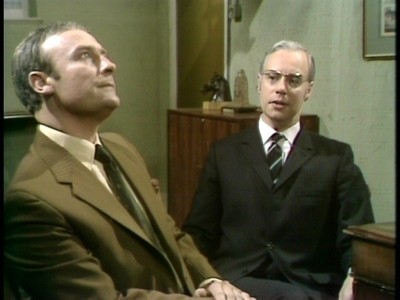
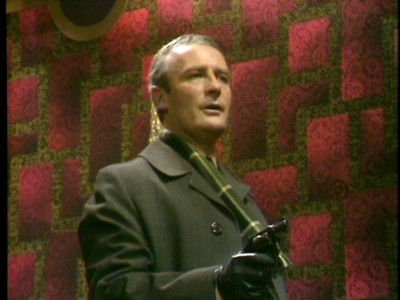
That central theme is most forcefully put forth in this series' three-part final episode, The Richmond File, where Callan realizes all too late that his fate is absolutely no different than that of the hunted Russian spy, Richmond (extremely well-played by T.P. McKenna). Proving just as tough and wily as Callan, the urbane, sophisticated Richmond taunts Callan with his working-class background (something that rises the ire of the scrappy Callan) when Callan first tries to flush out supposed-defector Richmond's true motives. Eventually, however, a bond forms between the two men when Callan realizes that Richmond's dilemma is his own: Richmond can't stay in England because he'll be brainwashed into mental retardation for his secrets (as Callan almost was when he was a prisoner of the drug-wielding Russian interrogators), and he can't return to Russia because...he'll equally be a suspect based on what he knows and his adventures abroad. When Callan finally corners and wounds Richmond, Callan admits he aimed not to kill, because he feels pity for Richmond. It's this same pity that compels Callan to head Richmond's pleas for a mercy kill - death at the hands of a true friend is preferable to death at the hands of either his own government, or the enemy's. That's a tough line to walk in 13 episodes of a one-hour television series: to get across that these emotionally scarred professionals really have nothing to live for outside of their jobs, jobs which they know are killing them psychologically. No friends to speak of, certainly no families. No fantasy beliefs in justice or a noble cause. Just...nothingness. A pretty bleak picture for a weekly television series.
Certainly that's why the only ray of hope in the series comes from the most unlikely of friendships (if it can even be called that): Callan's and Lonely's. And to the series' and its creator and supervising writer, James Mitchell's credit, this "friendship" is only faintly shown as a saving grace for the two men. In a powerful scene in If He Can, So Could I, Callan breaks down into a drunken mess with Lonely at his apartment, raging against the violence that pollutes his soul. Lonely, uncomprehending of what Callan is saying, begins to cry not out of existential commiseration, but out of simple decency: his friend is hurting, and that hurts him, as well. It's a complex relationship between the two men. Callan is contemptuous of Lonely, and physically threatens him on a regular basis, but he somehow clings to Lonely, as well, going so far as to save his life when Lonely winds up in a "red" death file, because quite simply, he has absolutely no one else in his life. The Lonely character shows some growth in this wrap-up, actually standing up to Callan at one point, and then declaring at the end of the series, when he's taken a bullet for Callan, that they're even now: he doesn't owe Callan anything anymore.
It's a restricted, screwed-down-tight "friendship," but at least there are real emotions there, as opposed to the deliberately superficial, snotty, taunting pose that agent Toby Meres presents to Callan. A public school bully grown up with a gun and a license to kill, the deliciously catty, perverse Toby (Valentine is marvelously laid-back and slyly witty) provides quite a few comedic moments in this go-around, and he actually helps out Callan more than once when he could have just let him die, but theirs is not a friendship, considering Toby looks down on the commoner Callan, and believes that he, not Callan, should be number one in "The Section." Even in his work, the one place where his competence at killing is also his emotional downfall, Callan can't find the solace of friendship in his fellow agents. That's why he brings in Lonely as a subcontracted aide, driving a "Section"-bough taxi as a mobile communications facility, and why he uses him as a legman for his tougher assignments. He may not actually "like" Lonely - and Lonely seems to fear more than like Callan - but he's all Callan has. And that pathetic restrictiveness, contrasted with the show's nihilistic, depressing world view, gives Callan an admirable emotional heft one doesn't see too often in this kind of genre work.
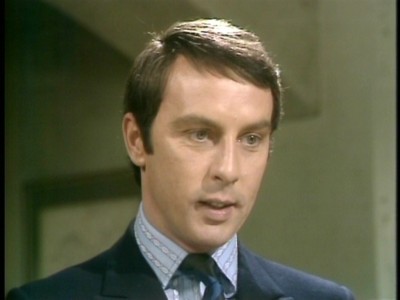
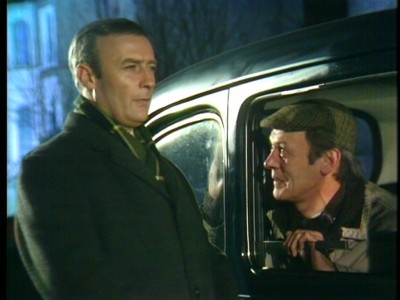
Here are the 13 episodes of the four-disc box set, Callan - Set 2, as described on their slimcase back covers:
VOLUME ONE
Episode 1: That'll Be the Day
With Callan captured, imprisoned, and interrogated by the Soviets, his superiors stage his funeral. But Callan's pal and sometime employee, Lonely, sees through the charade and makes a nuisance of himself, much to the section's chagrin.
Episode 2: Call Me Sir!
Upon Callan's return, dire circumstances force him to accept a new position within the section - one that affords an entirely different perspective on his work, particularly regarding his relationship with Lonely.
Episode 3: First Refusal
When a third-party broker offers to sell the names of British agents in Eastern Europe for £100,000, Callan suspects a leak in London and races to find it before the broker's proposal expires.
Episode 4: Rules of the Game
After Moscow expels a British cultural attaché, Callan assigns Cross to harass a Russian embassy employee and force the man's withdrawal. This tit-for-tat arrangement turns complicated, though, when the Russian's family gets involved.
VOLUME TWO
Episode 5: If He Can, So Could I
Cross' behavior on his previous assignment calls into question his fitness for service. Nevertheless, Callan assigns his former rival the perilous task of protecting a dissident Russian poet.
Episode 6: None of Your Business
Relieved of his duties, Callan intends to go on holiday. However, his superiors have relieved him of his passport as well - forcing him to acquire a new one by any means necessary.
Episode 7: Charlie Says It's Goodbye
Assigned to shadow an upper-crust economist expected to defect to Poland, Callan becomes involved with a beautiful widow who has good reason to despise intelligence agents.
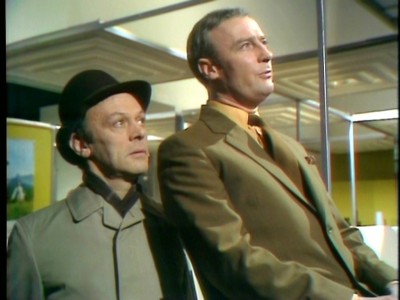
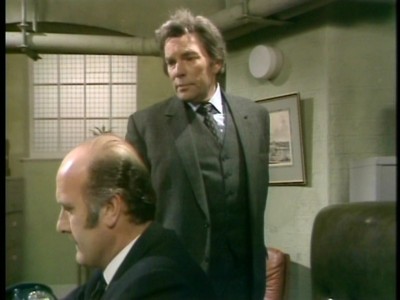
VOLUME THREE
Episode 8: I Never Wanted the Job
After witnessing a gangster's execution, Lonely runs afoul of the killers and the police, jeopardizing both his cover and Callan's life.
Episode 9: The Carrier
Callan and Lonely burglarize a scientist's home to photograph top-secret documents. But Lonely's sticky fingers endanger the entire operation.
Episode 10: The Contract
Callan tries to intercept an assassin hired to murder a visiting dignitary but winds up assuming the killer's identity. Will he find himself forced to fulfill the contract, too?
VOLUME FOUR
Episode 11: The Richmond File - Call Me Enemy
Alone at a remote safe house, Callan debriefs a high-ranking prospective defector - a man known as Richmond, who promises to reveal a traitor within the section.
Episode 12: The Richmond File - Do You Recognize the Woman?
Attempting to stay one step ahead of Richmond, Callan visits an old nemesis in prison: Flo Mayhew, the woman who set a trap for him using Lonely as bait. Now, however, he intends to turn the tables.
Episode 13: The Richmond File - A Man Like Me
Still on the loose, Richmond activates a sleeper agent and seeks refuge in the man's home. Meanwhile, Hunter has marshaled all of the section's resources to find the Russian and flush him out.
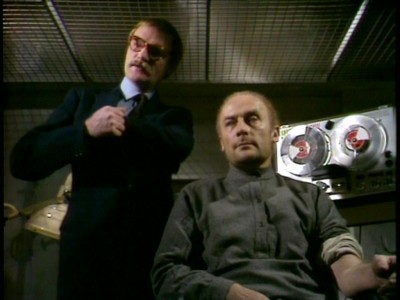
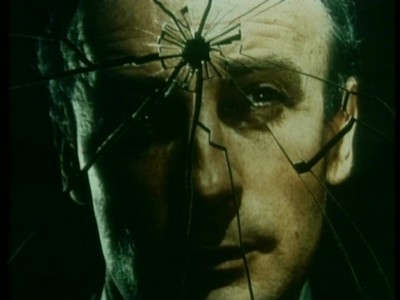
The DVD:
The Video:
As with the first set of Callan, the original source materials for these full screen, 1.33:1 transfers don't exactly help the already crappy video look of Callan - Set 2. Video noise, drop-out, hot spots, and other expected video anomalies were apparently beyond Acorn Media's powers to correct (as they correctly state in their on-box and on-screen disclaimer). If you're used to these kinds of British TV series from the 70s (with interiors shot on inferior video tape, and exteriors on murky 16mm), you won't mind this look. You'll expect it (and to some extent, the grimness of the series' look compliments the series' themes).
The Audio:
The Dolby Digital English mono audio track has some hiss, but again, it's like the video: you expect this from British TV productions of the time. The lack of subtitles or close-captions doesn't help with some of the stronger English accents here.
The Extras:
Luckily, two episode commentaries featuring Edward Woodward have been included here (he mentions Australia several times in a few shout-outs, so I'm assuming these were recorded for the Australian releases of these DVDs?). He gives out a lot of good insight into the show's production, and as always, he's thoughtful and quite amusing, too.
Final Thoughts:
Even better than the last set. Callan - Set 2 wraps up the cult British spy series (a couple of movies would follow) in fine fashion, as Edward Woodward's Callan descends into almost complete emotional collapse as his small, perverse world of back-stabbing and double-dealing crumples in on itself. Unusually literate, densely plotted scripts this time, with more action, to boot. This final series ranks with the best television espionage offerings out there. I highly recommend Callan - Set 2.
Paul Mavis is an internationally published film and television historian, a member of the Online Film Critics Society, and the author of The Espionage Filmography.


|
| Popular Reviews |
| Sponsored Links |
|
|
| Sponsored Links |
|
|
| Release List | Reviews | Shop | Newsletter | Forum | DVD Giveaways | Blu-Ray | Advertise |
|
Copyright 2024 DVDTalk.com All Rights Reserved. Legal Info, Privacy Policy, Terms of Use,
Manage Preferences,
Your Privacy Choices | |||||||













